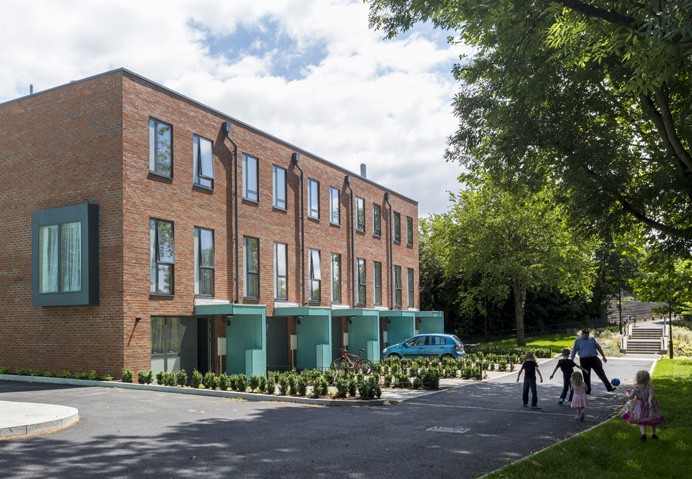Ealing Council, as the borough’s biggest landlord, is stepping up to the challenge of increasing the supply of affordable housing while rents and house prices rise across London. We spoke to a family in one of the new homes built as part of a project setting new standards.
Like other councils, Ealing is responding to the aftermath of the financial crisis, along with some of the most radical changes to welfare reform and national housing policy in recent history. It makes transforming the borough’s ageing housing stock, getting new homes built and creating well-designed, affordable and safer neighbourhoods a significant but important task.
The council is now actively engaged in building new homes on a reasonably large scale for the first time in more than 30 years – and having to do so in a creative and entrepreneurial way, as a project at Copley Close in Hanwell illustrates.
Copley is a leading part of the council’s ambitious programme of modernising and remodelling our old estates. It will play a role in the ongoing work to supply more affordable housing.
Between 2014-18, 540 new council homes will have been built or will be being built across the borough; and a further 1,167 affordable homes will be created by housing associations.
Setting new standards
Copley Close in Hanwell was built in the 1970s by the Greater London Council and is a long, narrow development of more than 600 homes.
A comprehensive council review identified a need to refurbish and replace the ageing social housing at Copley. Residents and businesses were consulted about the proposals with the resulting masterplan winning ‘best conceptual project’ at the prestigious London Planning Awards.
Work is now well under way, with new homes being built – and some people have already moved in.
‘It is amazing quality’
Charlotte and Mark Laws and their children moved into a new house in Copley in May. They were previously council tenants in a smaller home on a different estate in the borough that has yet to be regenerated. They say it has made a real difference to family life.

Charlotte said: “When we viewed it I couldn’t believe it. It is amazing quality – much better than you usually find in council homes. It is a better size for our family too, and we are ever so grateful. Everyone seems to be friendly and it is nice to be able to speak to your neighbours.”
She added, laughing: “It is so good here that I’m still waiting for them to tell me they have made a mistake and we have to leave.”
‘Proud and safe’
Councillor Jasbir Anand, cabinet member for housing, said: “It’s important to realise that places like Copley are a neighbourhood – a little part of the world people can call home, where they want to feel proud and safe when they open the front door.
“So, on our large-scale regeneration projects it’s important we secure community buy-in and make residents themselves part of the process of transformation. This goes beyond making sure homes are fit for purpose. It is about a sense of community, too. We want housing officers, police, councillors and community groups around the table, sharing information and forming partnerships. We encourage people to come together and report things like littering, fly-tipping, dog fouling and other anti-social behaviour. And when they do it’s important we act quickly to address those issues.”
What is different about Copley?
Copley will become a mixed tenure development – which means a variety of homes being available for council tenants, private sale, shared ownership and affordable rent. All homes will have the same uncompromisingly high standard of design, regardless of whether they are for council tenants, private rent or sale.
Unusually for a large estate regeneration project, Copley will not be transferring into the hands of a housing association upon completion. Ealing Council is using its own resources, and its wholly owned subsidiary company Broadway Living, to both fund the refurbishment and to build new homes for sale and rent.
This allows the council to retain the value of its land and use the sale of homes to subsidise the cost of building more affordable housing.
Councillor Anand added: “Council-owned housing companies like Broadway Living allow councils greater flexibility. Indeed, Ealing Council set up Broadway Living specifically to address the lack of good quality, public-funded, affordable rental accommodation in Ealing.”
For more information visit www.ealing.gov.uk/housing





